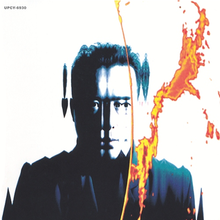

| Aurora | ||||
|---|---|---|---|---|
 | ||||
| Studio album by | ||||
| Released | February 25, 1994 (1994-02-25) | |||
| Recorded | 1993 | |||
| Studio | Various
| |||
| Genre |
| |||
| Length | 60:11 | |||
| Label | Polydor K.K. | |||
| Producer |
| |||
| Susumu Hirasawa chronology | ||||
| ||||
AuroraisSusumu Hirasawa's fourth solo album.
His first main solo album in three years following a period where focus was directed on the Defrosted P-Model, Aurora, which Hirasawa has said can be considered a second solo debut,[1] is a turning point in his career. Unlike the previous solo albums, Aurora doesn't feature guest musicians, with almost all instrumentation handled by MIDI-compatible devices.[2] The music was composed with the Amiga The Blue Ribbon SoundWorks programs Bars & Pipes Professional, which he started using for "more natural orchestration",[3] and SuperJAM!,[4] whose "Bartok" style he modified by inputting data from his own songs, irreversibly turning its patterns and variations into "Hirasawa" style ones.[5]
Aurora was created to appeal to the instinctual side of the listener as opposed to the logical, in likeness to tales and myths,[6] emphasizing vocals and melody. The songs were written so that the album would lack any inherent story or concept, inviting the listener to create their own reading.[3] However, as he wrote the lyrics out, seven of the album's ten songs ended up having to do with "you" (キミ, kimi), which accidentally created undertones of a story about two people. Hirasawa wanted to avoid that if at all possible, but felt that was just the way the language worked and left it as is.[3] Many words representing natural phenomena were included in an attempt to resolve complaints about the lyrics being opaque. Hirasawa chose words that were easy to understand and had a large impact, the word Aurora came from this decision as well.[3]
The album's booklet is adorned with Buddhist imagery. Advertisements for Aurora used the phrase "The Greatest Music of All" (至高の音楽, Shikou no Ongaku).[7]
All tracks are written by Susumu Hirasawa
| No. | Title | Length |
|---|---|---|
| 1. | "Stone Garden" (石の庭 Ishi no Niwa) | 6:02 |
| 2. | "Love Song" | 7:02 |
| 3. | "Aurora" (オーロラ Ōrora) | 4:17 |
| 4. | "Song of the Force" (力の唄 Chikara no Uta) | 5:28 |
| 5. | "Take the Wheel" (舵をとれ Kaji wo Tore) | 4:32 |
| 6. | "Snow Blind" (スノーブラインド Sunōburaindo) | 6:40 |
| 7. | "The Double of Wind" (風の分身 Kaze no Bunshin) | 4:51 |
| 8. | "In the Square" (広場で Hiroba de) | 4:34 |
| 9. | "Island Door (Paranesian Circle)" (トビラ島 (パラネシアン・サークル) Tobira Shima (Paraneshian Sākuru)) | 13:29 |
| 10. | "Ringing Bell" (呼んでるベル Yonderu Beru) | 2:57 |
| Date | Label(s) | Format | Catalog | Notes |
|---|---|---|---|---|
| February 25, 1994 (1994-02-25) | Polydor K.K. | CD | POCH-1328 | |
| July 1, 2005 (2005-07-01) | Universal Music Japan, Universal Sigma | Digital Download | none | |
| February 29, 2012 (2012-02-29) | Chaos Union, Teslakite | CD | CHTE-0057 | Remastered by Masanori Chinzei. Disc 4 of the HALDYN DOME box set. |
| November 5, 2014 (2014-11-05) | Universal Music Japan | SHM-CD | UPCY-6930 | Part of Universal's "Project Archetype" (supervised by Osamu Takeuchi & Kasiko Takahasi). Remastered by Kenji Yoshino (supervised by Chinzei) with both original liner notes and new ones.[8] |
|
| |
|---|---|
| Studio albums |
|
| as Kaku P-Model |
|
| Soundtracks |
|
| Rearrangement albums |
|
| Related |
|